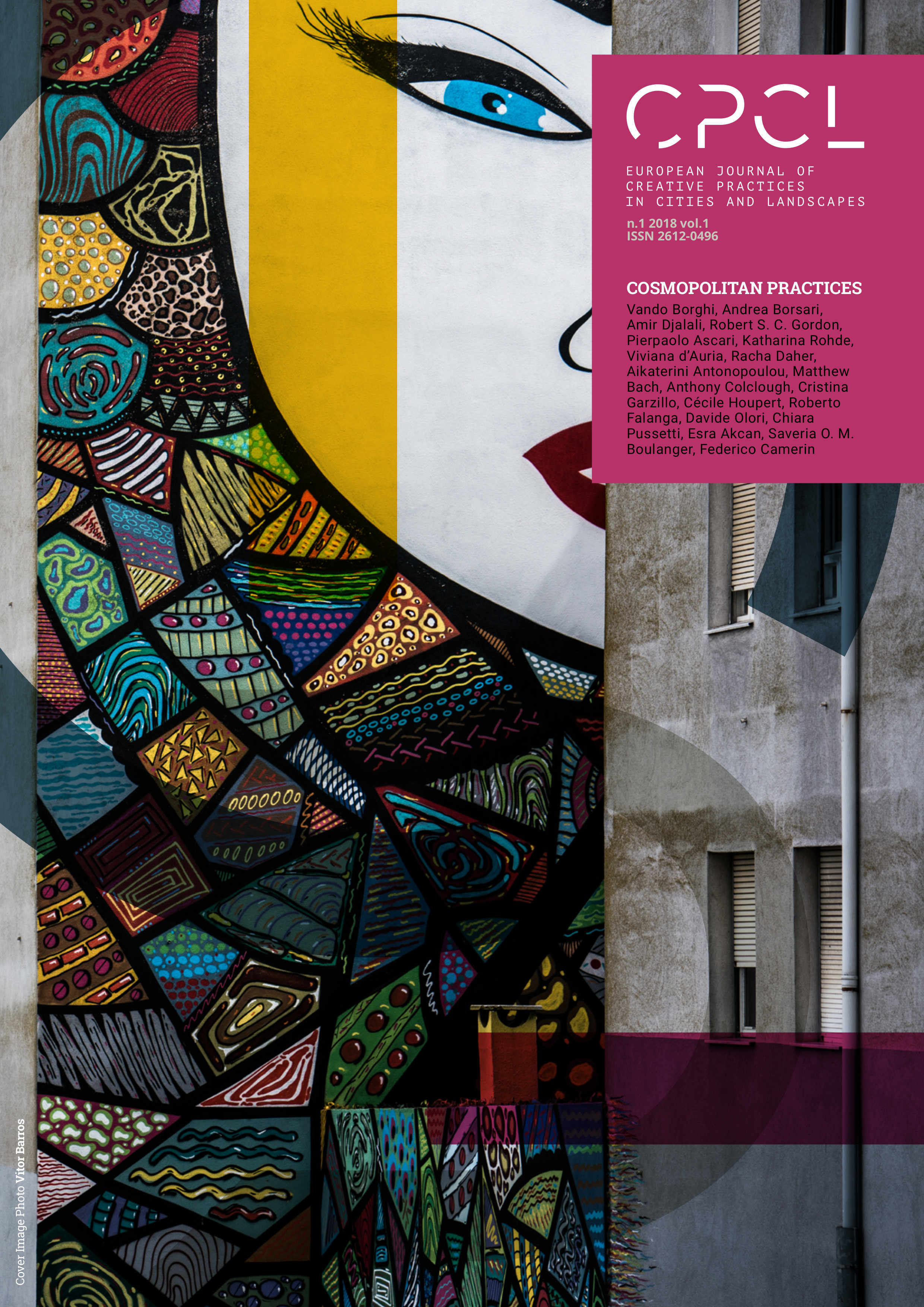Building Cosmopolitan Citizenship Through the Mundane: Insights from Walking Conversations in the Public Spaces of Berlin
DOI:
https://doi.org/10.6092/issn.2612-0496/8510Keywords:
Berlin, cultural citizenship, pedetic force, refugeesAbstract
This contribution focuses on the urban environment of Berlin and the role of walking as a generator of cosmopolitan citizenship that builds on migrant agency as a prime contribution to city-making. It explores the re-shaping of Berlin in the course of the “refugee crisis” and the resulting engagement by displaced persons and urban practitioners to foster interaction between a wide array of participants, independent of their citizenship status. By building on Thomas Nail’s kino-political approach to migration, which identifies in the migrant’s pedetic force a prime source of agency, three urban projects involving the act of walking are analyzed. While these initiatives vary in terms of project articulation, they all use the urban fabric of Berlin as a key terrain for discussion and critique. The walking conversations become an expression of exercising cultural citizenship, whereby the right of membership exists prior to the allocation of official statuses. This seemingly mundane experience plays a relevant role in reinstating the defining feature of the migrant as that of movement, in contrast with the constraints of containment that displaced persons experience. The three cases illustrate how the successive instances of them leaving the camps, exploring Berlin's spaces and taking the lead in narrating the city contribute to the reinforcement of a cosmopolitan perspective.References
Abel, Andreas. “Senat baut 36 neue Flüchtlingsheime in Berlin.” Berliner Morgenpost, April 13, 2015, https://www.morgenpost.de/berlin/article139453814/Senat-baut-36-neue-Fluechtlingsheime-in-Berlin.html (accessed October 18, 2018)
Agier, Michel and Babels. De Lesbos à Calais: comment l ́Europe fabrique des camps Lyon: Le Passager Clandestin, 2017.
Allmende Kontor. “Vernetzung für urbane Gemeinschaftsgärten,” http://allmende-kontor.de/index.php/kontor.html (accessed November 14, 2018)
AWO. “AWO Refugium Buch,” https://www.awo-mitte.de/index.php/unterkuenfte-fuer-gefluechtete/awo-refugium-buch (accessed November 14, 2018)
Berenstein Jacques, Paola (ed.) Apologia da Deriva. Escritos situacionistas sobre a cidade. Rio de Janeiro: Casa da Palavra, 2003.
Berlin Mondiale. “Kunst im Kontext Migration, Flucht und Exil,” https://berlin-mondiale.de/ (accessed November 14, 2018).
Bloch, Alice and Carl Levy (eds.) “Refugees, Citizenship and Social Policy in Europe.” London: Macmillan, 1999.
Francesco Careri. Walkscapes. Camminare come pratica estetica. Turin: Einaudi, 2006.
Cilliers, Judy-Ann. “The Refugee as Citizen: the possibility of political membership in a cosmopolitan world.” Master Thesis, University of Stellenbosch, 2014.
Conscience urbaine. “Marche exploratoire,” https://conscienceurbaine.net/servicess/marche-exploratoire/ (accessed November 13, 2018).
Debord, Guy. “Théorie de la derive.” Les lèvres nues 9, 1956.
ECRE. “Position on the integration of refugees in Europe,” https://www.refworld.org/publisher,ECRE,,,3f4e5c154,0.html (Accessed November 26, 2018).
Fehrmann, Silvia. Wir können auch anders - “Cultural Citizenship” als Herausforderung für Kultureinrichtungen in einer vielfältigen Gesellschaft, https://heimatkunde.boell.de/2012/12/18/wir-koennen-auch-anders-cultural-citizenship-als-herausforderung-fuer-kultureinrichtungen (accessed November 14 2018).
Kultur Bewegt. http://www.kulturbewegt.de/, (accessed August 14, 2018).
Lang, Peter T. “Stalker on Location.” In Loose Space: Possibilities and Diversity in Urban Life, edited by Karen Franck and Quentin Stevens. Routledge, 2006.
Lichtenstein, Dennis, Jenny Ritter andBirte Fähnrich. “The Migrant Crisis in German Public Discourse.” In The Migrant Crisis. European Perspectives and National Discourses, edited by Meani Barlai et al. Zurich: LIT Verlag, 2017.
McNevin, Anne. “Political Belonging in a Neoliberal Era: The Struggle of the Sans-Papiers.” In Citizenship Studies 10, no. 2 (2006): 135-51. DOI: 10.1080/13621020600633051.
Nail, Thomas. The Figure of the Migrant. Stanford, CA: Stanford University Press, 2015.
Nguyen, Thien Vinh. “Learning to Walk: on curating a walking-methodologies programme.” In Engaged Urbanism: Cities and Methodologies, edited by Ben Campkin and Ger Duijzings. London and New York: IB Tauris, 2016.
Querstadtein, https://querstadtein.org/ (accessed October 14, 2018).
Refugee Voices Tours, http://refugeevoicestours.org/ (accessed October 14, 2018).
RBB. “Senat plant 25 weitere Modulare Unterkünfte für Flüchtlinge,” https://www.rbb24.de/politik/beitrag/2018/02/standorte-berlin-modulare-unterkuenfte.html (accessed November 14, 2018)
Rosaldo, Renato. “Cultural Citizenship and Educational Democracy.” In Cultural Anthropology 9, no. 3 (1994): 402-11. DOI: 10.1525/can.1994.9.3.02a00110.
Route 44. “City guides in Neukölln,” route44-neukoelln.de http://www.route44-neukoelln.de/, (accessed August 14, 2018).
Simon Sadler, The Situationist City. Cambridge: MIT Press, 1998.
Spatial Agency. “Stalker/Osservatorio Nomade,” http://www.spatialagency.net/database/why/political/stalkerosservatorio.nomade (accessed November 15, 2018).
Scholten, Peter, Fleur Baggerman, Linda Dellouche, Venja Kampen, Julia Wolf, and Rick Ypma. Policy innovation in Refugee Integration? A comparative analysis of innovative policy strategies toward refugee integration in Europe (Dutch Department of Social Affairs, August 2017).
Stevenson, Nick. "Cultural Citizenship in the ‘Cultural’ Society: A Cosmopolitan Approach." In Citizenship Studies 7, no. 3 (2003): 331-48. doi:10.1080/1362102032000098904.
The Senate of Berlin. “Zahlen & Fakten,” https://www.berlin.de/laf/ankommen/aktuelle-ankunftszahlen/artikel.625503.php (accessed November 14, 2018).
Waldron, Jeremy. “Cosmopolitan norms.” In: Another Cosmopolitanism, edited by Seyla Benhabib. Oxford: Oxford University Press, 2006.
Published
How to Cite
Issue
Section
License
Copyright (c) 2018 Katharina Rohde, Viviana d'Auria
Copyrights and publishing rights of all the texts on this journal belong to the respective authors without restrictions.This journal is licensed under a Creative Commons Attribution 4.0 International License (full legal code).
See also our Open Access Policy.





